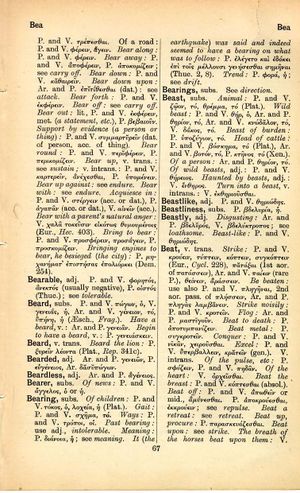beard: Difference between revisions
From LSJ
ἵνα οὖν μηδ' ἐν τούτῳ δῷ αὐτοῖς λαβήν (Photius, Fragments on the Epistle to the Romans 483.26) → so that he doesn't give them even here a handle (= an opportunity for refutation)
m (Text replacement - "<b class="b2">Frag.</b>" to "''Frag.''") |
m (Woodhouse1 replacement) |
||
| Line 1: | Line 1: | ||
{{Woodhouse1 | {{Woodhouse1 | ||
|Text=[[File:woodhouse_67.jpg|thumb|link={{filepath:woodhouse_67.jpg}}]] | |Text=[[File:woodhouse_67.jpg|thumb|link={{filepath:woodhouse_67.jpg}}]] | ||
===substantive=== | |||
P. and V. [[πώγων]], ὁ, V. [[γενειάς]], ἡ, Ar. and V. [[γένειον]], τό, [[ὑπήνη]], ἡ (Aesch., '' | [[prose|P.]] and [[verse|V.]] [[πώγων]], ὁ, [[verse|V.]] [[γενειάς]], ἡ, [[Aristophanes|Ar.]] and [[verse|V.]] [[γένειον]], τό, [[ὑπήνη]], ἡ ([[Aeschylus|Aesch.]], ''Fragment''). | ||
[[have a beard]], v.: [[Aristophanes|Ar.]] and [[prose|P.]] [[γενειᾶν]]. | |||
[[begin to have a beard]], v.: [[prose|P.]] [[γενειάσκειν]]. | |||
===verb transitive=== | |||
[[beard the lion]]: [[prose|P.]] [[ξυρεῖν λέοντα]] ([[Plato]], ''[[Republic]]'' 341C). | |||
}} | }} | ||
Revision as of 08:53, 20 May 2020
English > Greek (Woodhouse)
substantive
P. and V. πώγων, ὁ, V. γενειάς, ἡ, Ar. and V. γένειον, τό, ὑπήνη, ἡ (Aesch., Fragment).
have a beard, v.: Ar. and P. γενειᾶν.
begin to have a beard, v.: P. γενειάσκειν.
verb transitive
beard the lion: P. ξυρεῖν λέοντα (Plato, Republic 341C).

